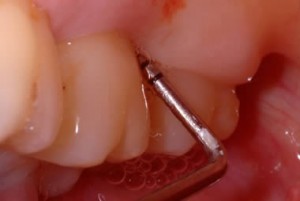Periodontitis – A Major Cause Of Tooth Loss
Looking after your gums shouldn’t be of secondary importance to your teeth
 Many of us will have been told to”make sure that you clean your teeth well” by our parents when we were younger. This is good advice but not complete. They should also have included making sure that you clean your gums well too. Of course, depending on your age, your parents may not have been as aware as we are today of the importance of having healthy gums.
Many of us will have been told to”make sure that you clean your teeth well” by our parents when we were younger. This is good advice but not complete. They should also have included making sure that you clean your gums well too. Of course, depending on your age, your parents may not have been as aware as we are today of the importance of having healthy gums.
Most advertisements on TV that promote gum health products focus on the fact that your gums may bleed if you have gum disease. Whilst this is one of the more visible symptoms when it occurs, it is not the worst thing that can happen if you don’t see a dental hygienist to help you control and manage the problem.
A ‘slow burning’ disease
The fact is that gum disease does not happen overnight and gradually builds up from what might be a mild case to very severe indeed. This is good news as it means that there is much that we can do to minimise gum disease and intervene when it does occur and before it becomes more serious. With the help of our experienced dental hygienists at the Foxhall Dental Practice, there is no reason why you should not have a healthy set of gum.
Gum disease is often categorised into two broad stages, gingivitis and periodontitis. We will take a brief look at both of these now.
Gingivitis
Gingivitis is an earlier stage of gum disease and one that is usually not too severe and can be treated by the patient both improving how they look after their gums plus professional gum cleans known as a ‘scale and polish’ which can be carried out at our local Ipswich dentist. Early symptoms of gingivitis can include bleeding gums, soreness, redness or inflammation of the gums and bad breath. It is quite possible for only some or even none of these to be present though and this is why we recommend that you see a hygienist every six months for your professional clean.
Periodontitis
Periodontitis is more serious than gingivitis and can be much more difficult to treat. Many of the symptoms are the same but can also include wobbly or loose teeth. This is because by the time this stage is reached, the bacteria are attacking not only the fleshy part of the gums but also the bone surrounding the roots of the teeth. When this happens, the bone weakens and becomes damaged making it much more difficult for the tooth to be held securely in place.
Unlike gingivitis, periodontitis can’t be treated with a straightforward professional clean but requires invasive dental surgery to try to save the tooth. This has to be carried out by a suitably qualified dentist and the treatment is known as a ‘deep clean’ or ‘root scaling’.
This procedure will require a local anaesthetic to alleviate any discomfort that you might feel as the gums may need to be ‘peeled back’ or even cut into a little so that the root of the tooth can be accessed. Any bacteria will then need to be removed both from the root of the tooth and any surrounding bone tissue. Whilst this is the only way to reverse this problem, it doesn’t have a 100% success rate and it is far better to avoid the problem reaching this advanced stage.
Healthy gum maintenance
Having described what can happen if you allow your gum health to deteriorate, it is important to understand what you, the patient, can do to prevent the problem from getting this far. Fortunately, for most of us, maintaining healthy gums is not too difficult and just requires some careful cleaning and regular professional help. Some patients who have less healthy immune systems may require more frequent intervention by the hygienist and we will discuss this with those patients when we see them.
The following guide to healthy gums applies to us all though and we are sure that most of you will recognise at least one area where you have some room for improvement yourself.
- Brush your teeth AND your gums (lightly) twice daily with a good quality toothpaste
- Make sure that the bristles on your brush are healthy and not worn out (change at approximately 3 month intervals)
- When you brush, angle the bristles so that they reach down into the gum line so that they can reach any bacteria trapped there
- Use dental floss on a daily basis. Ask the hygienist to demonstrate how
- Have a 6 monthly ‘scale and polish’ and gum health check (or more frequently for those more vulnerable to gum disease)
Just these few simple steps should mean that you maintain healthy gums and not only avoid the catastrophic effect of tooth loss but also have fresher smelling breath into the bargain.
If you don’t currently see a dental hygienist on a regular basis, now is the time to correct that and improve your gum health. You can arrange an appointment to see our Ipswich dental hygienist by calling the Foxhall Dental Practice on 01473 258396.
